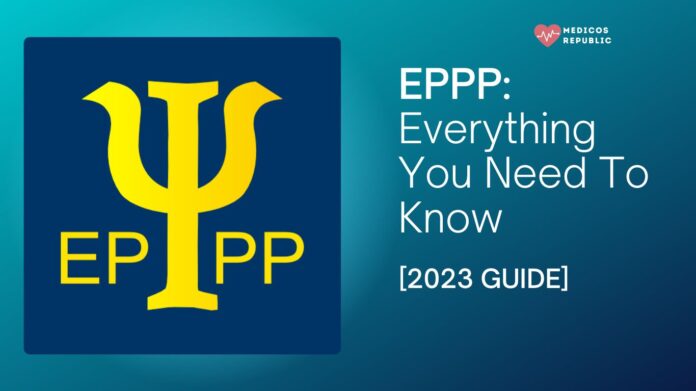EPPP stands for Examination for Professional Practice in Psychology, it is a standardized licensing exam designed to assess the level of knowledge and skill expertise of candidates seeking a license-to-practice as psychologists. This exam is administered by the Association of State and Provincial Psychology Boards (ASPPB), the EPPP exam covers a wide range of topics related to the subject of psychology, which mainly includes assessment and diagnosis, ethics and professional practice, biological bases of behavior, social and cultural bases of behavior, and treatment and intervention. Passing the EPPP exam is a key requirement for obtaining licensure as a psychologist in the majority of states and provinces.
Today, in this comprehensive guide, we are going to provide you with everything you need to know about the EPPP licensing exam. We hope that you find this article useful in understanding the important aspects of this exam and be able to pass EPPP on the first go! 🙂

EPPP Exam Format
The Examination for Professional Practice in Psychology (EPPP) is a computer-based exam consisting of 225 multiple-choice questions. The EPPP exam is divided into two parts, each part is conducted with a different time limit:
EPPP Part 1
The first part of the EPPP exam comprises 155 questions and has a time limit of 200 minutes (3 hours and 20 minutes). The questions in this part of the exam cover a wide range of topics related to psychology which are discussed here.
EPPP Part 2
The second part of the exam consists of 70 questions in total and has a time limit of 90 minutes. EPPP Part 2 is a skills-based exam that tests the candidates using real-world scenarios that psychologists face in their practice.
Below are the jurisdictions currently requiring EPPP (Part 2 -Skills):
- District of Columbia
- Georgia
- Guam
- Manitoba
- Nevada
- Newfoundland and Labrador
- Prince Edward Island
The EPPP exam is designed to assess a candidate’s ability to apply their acquired knowledge of psychology in real-world situations. The questions on the exam are mostly scenario-based, and candidates are asked to apply their learned knowledge to a specific case or situation.
The EPPP exam is scored on a scale of 200-800, with a passing score decided by each state or provincial licensing board. Candidates receive their exam scores within 4-6 weeks after taking the exam.
EPPP Exam Domains
The questions on the Examination for Professional Practice in Psychology are divided into eight domains, which are as follows:
Content Areas of the EPPP Exam |
||
| Domain | % of Exam | Related Topics |
|
1. Biological Bases of Behavior
|
10% | This content area covers topics such as Neurobiological bases, genetic bases, drugs for psychological disorders, technology like brain imaging and genetic screening |
|
2. Cognitive-affective bases of behavior
|
13% | This content area covers topics such as Research-based theories and applications; for example learning, intelligence, memory, emotion, perception, language |
|
3. Social and cultural bases of behavior
|
11% | This content area covers topics such as Personalities, diversity, oppression, family systems, work groups |
|
4. Growth and lifespan development
|
12% | This content area covers topics such as Individual-environmental interaction, family development, life events |
|
5. Assessment and diagnosis
|
16% | This content area covers topics such as Psychometric theories, assessment models, assessment instruments, assessment methods, epidemiology, use of technology |
|
6. Treatment and intervention
|
15% | This content area covers topics such as Health promotion, risk reduction, rehabilitation with special populations, career development, healthcare systems, and organizations |
|
7. Research methods and statistics
|
7% | This content area covers topics such as Research design, data collection, sampling, statistics, evaluation strategies |
|
8. Ethical, legal, and professional issues
|
15% | This content area covers topics such as APA and CPA principles and codes, patient rights, ethical decision-making |
Each content area of the EPPP exam is weighted differently, with the majority of the questions (around 34%) primarily focused on assessing a candidate’s ability to formulate a functional diagnosis. Candidates must achieve a required passing score as determined by their respective state or provincial licensing board in order to obtain the final license-to-practice as a professional psychologist.
EPPP Passing Score
The passing score for the Examination for Professional Practice in Psychology (EPPP) is decided by each state or provincial licensing authority. The Association of State and Provincial Psychology Boards (ASPPB), which administers the EPPP exam, does not necessarily set a universal passing score for the exam.
Each state or provincial licensing board establishes its own passing score based on its individual standard of requirements and regulations. Generally speaking, the passing score for the EPPP is set at a level that is considered to be a minimum level of competence for an entry-level psychologist in that particular jurisdiction.
The EPPP exam has 225 multiple-choice questions (MCQs) and out of those, only 175 questions are actually counted in the final result estimation. Whereas, the remaining 50 are counted separately as “pretest” questions. A raw score is generated by the assessment board that is based on the number of questions answered correctly by the candidate and is subsequently scaled between 200-800.
Every jurisdiction has an autonomous board that independently decides the minimum passing score as per their standard passing criteria. However, in the year 2019, all respective states set the minimum passing score for the EPPP exam at 500. A score of 500 is the minimum passing score recommended by the Association of State and Provincial Psychology Boards (ASPPB) for independent psychology practice but for supervised psychology practice, the ASPPB recommends a minimum score of 450.
EPPP Exam Fees
Below are a few quick facts in this regard:
- EPPP Exam Fee: $600 USD
- EPPP examination center fee: $87.50 USD
- Administrative fee: %63.50 USD (may differ depending upon individual jurisdiction)
EPPP Eligibility Requirements
In order to take the Examination for Professional Practice in Psychology (EPPP), candidates are required to meet the required eligibility criteria determined by their jurisdiction or provincial licensing authority. These requirements are subject to change from one jurisdiction to the other. Therefore, candidates are strongly advised to contact their provincial licensing authority to ascertain their specific eligibility requirements.
The EPPP eligibility criteria include the following:
- Completion of a doctoral degree in psychology: EPPP exam candidates are required to have completed a doctoral degree in psychology from an accredited institution before registering for the exam. Moreover, the degree program must include coursework in the disciplines covered by the EPPP domains (as mentioned above).
- Supervised clinical experience: Candidates are required to have completed a certain amount of supervised clinical hours, typically ranging between 1500 and 2000 hours depending upon the state or provincial licensing body. Moreover, the clinical experience must have been completed as part of the doctoral degree curriculum or through a recognized post-doctoral training program with required accreditation.
- Ethics and professional conduct: Candidates must have demonstrated knowledge of and adherence to ethical and professional conduct standards as established by their state or provincial licensing board.
- Background check: It is necessary that all EPPP exam candidates undergo a security background check as part of the licensure application procedure.
Please bear in mind that eligibility requirements may change over time. Hence, it is advised that candidates must always consult with their state or provincial licensing authority to ensure they are up-to-date with the approved requirements. In addition, candidates should begin the licensing process well before the time of their desired EPPP exam date because the application process can sometimes be lengthy and the candidates may be required to submit multiple verified credentials.
EPPP Preparation
Preparing for the Examination for Professional Practice in Psychology (EPPP) can be a very difficult task, but with the right approach and study techniques, candidates can feel confident and well-prepared for this crucial exam. Here are some important tips for EPPP exam preparation:
- Start early: Preparing for the EPPP is a time-consuming process as the course is very extensive, therefore, it is recommended that candidates should begin studying well in advance of their exam date to avoid last-minute anxiety. Devising a dedicated study routine can significantly help ensure that candidates are well-prepared for the exam.
- Create a study plan: Developing a study plan for EPPP can help candidates stay organized and on track with their exam preparation. A study plan should be specific and goal-oriented with deadlines for completing each EPPP content area, as well as practice exams and review sessions.
- Use high-yield study materials: There is a plethora of study materials available to help candidates boost their preparation for EPPP, including textbooks, flashcards, review course material, practice exams, and online study material. Candidates should explore different study materials available to them and decide what works for them best and decide what suits their individual needs.At the Medicos Republic, we share a great deal of study material for all kinds of exams, so do check out our blog regularly for more updates.
- Focus on your weak areas: It is very important that candidates identify their weaknesses and dedicate their focus where they feel less confident or have scored less on EPPP practice exams. By addressing individual weaknesses, candidates can significantly improve their overall scores on the exam.
- Practice time management: As discussed at the beginning of this blog post, EPPP is a timed exam, therefore, it is strongly recommended that candidates practice time management during their preparation by testing themselves in exam-like conditions. You can do this by setting a timer before attempting practice exams and trying to answer all the questions in the allowed exam time.
- Take care of your physical and mental health: Preparing for the EPPP can oftentimes be very mentally demanding and stressful, so candidates should prioritize their health above everything during this daunting journey. You can do this by getting enough sleep, exercising, and eating healthy food, as well as taking weekends off to help better manage stress levels. Moreover, always find time to engage in activities you take pleasure in because, with a relaxed state of mind, you will be able to perform much better.
By following the above-mentioned tips, candidates can prepare for the EPPP exam much better thereby improving their chances of success on the exam.
EPPP Exam Day Tips
Below are a few quick tips to help you succeed on exam day: 🙂
- Get plenty of sleep the night before your exam and stop studying before bedtime to allow your brain to relax.
- Eat a healthy breakfast loaded with carbs to fuel your brain and prevent stress-induced hypoglycemia during the exam. HAHA. 😀
- Arrive at the examination center early to allow time for registration and check-in. It is also advisable that you figure out the route to your test center a day earlier so that you do not get stuck in traffic.
- Manage your time effectively by pacing yourself with the clock throughout the exam.
- Stay calm and focused by using relaxation techniques so that you can lower your stress levels.
Conclusion
Passing the EPPP licensing exam is a crucial step for aspiring psychologists toward obtaining licensure. By understanding the syllabus, exam format, eligibility criteria, and preparation strategies, you can significantly increase your chances of passing EPPP the first time. The key to achieving this incredible feat is to stay focused, manage your study time effectively, and hard work. With a proper plan, dedication, and perseverance, you can achieve your goal of becoming a licensed psychologist.










![EPPP Secrets Study Guide PDF Free Download [Direct Link] EPPP Secrets Study Guide PDF](https://www.medicosrepublic.com/wp-content/uploads/2023/02/EPPP-Secrets-Study-Guide-PDF-Free-218x150.jpg)
![EPPP Practice Question Workbook: 900+ Multiple Choice Questions PDF Free Download [Direct Link] EPPP Practice Question Workbook: 900+ Multiple Choice Questions PDF](https://www.medicosrepublic.com/wp-content/uploads/2023/02/EPPP-Practice-Question-Workbook-900-Multiple-Choice-Questions-PDF-Free-218x150.jpg)






![Gerstmann Syndrome Features Mnemonic [Easy-to-remember] Gerstmann Syndrome Features Mnemonic](https://www.medicosrepublic.com/wp-content/uploads/2025/06/Gerstmann-Syndrome-Features-Mnemonic-150x150.jpg)
![Cerebellar Signs Mnemonic [Easy to remember] Cerebellar Signs Mnemonic](https://www.medicosrepublic.com/wp-content/uploads/2025/06/Cerebellar-Signs-Mnemonic-150x150.jpg)
![Seizure Features Mnemonic [Easy-to-remember] Seizure Features Mnemonic](https://www.medicosrepublic.com/wp-content/uploads/2025/06/Seizure-Features-Mnemonic-1-150x150.jpg)

![Recognizing end-of-life Mnemonic [Easy to remember]](https://www.medicosrepublic.com/wp-content/uploads/2025/06/Recognizing-end-of-life-Mnemonic-150x150.jpg)

![Multi-System Atrophy Mnemonic [Easy-to-remember] Multi-System Atrophy Mnemonic](https://www.medicosrepublic.com/wp-content/uploads/2025/06/Multi-System-Atrophy-Mnemonic-150x150.jpg)

![How to Remember Southern, Northern, and Western Blot Tests [Mnemonic] How to Remember Southern, Northern, and Western Blot Tests](https://www.medicosrepublic.com/wp-content/uploads/2025/06/How-to-Remember-Southern-Northern-and-Western-Blot-Tests-150x150.jpg)









